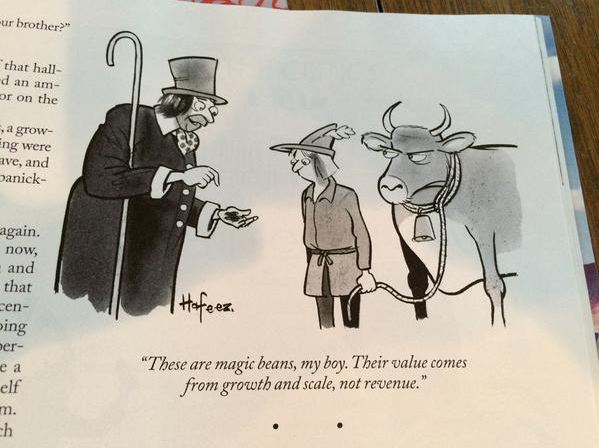
The question of the perfect team is timeless and yet the answer seems obvious as most successful startups are renown with their famous duo, or sole founder. Larry Page and Sergey Brin come to mind. Mark Zuckerberg seems to have done it alone, no? That media fervor for the unicorn startups and their celebrity founders lead us to believe that it only takes the one, or two, easily leading entrepreneurs to believe that they can build exceptional companies on their own, or with a co-founder. Beyond the famous teams, my mind is immediately drawn to the Founders Dating site or the Co-Founder Meetups which imply that the right team is merely a marriage of two partners. I think that’s rarely the case.
Consider the three men in a tub; the bravery, the heroics, as they endeavor together to the Faire. It goes without saying, piling into a tub and rowing out to sea took gumption, passion, and commitment. More importantly though, keep in mind that most nursery rhymes and fairy tales were tools that teach; born of an age still flush with mystery and mystic, people believed in witchcraft, had no concept of germs, and taught their children to beware of strangers by spinning yarns with hidden messages. The message implied, I think: that it took the three, and their unique talents working together as one, to succeed in spite of the stares from the critics. Sure, some called them fools but doesn’t it take a bit of foolishness?
Article Highlights
Three, not two
While the successful ventures with one or two founders abound, what’s easy to overlook is that there are three skillsets therein. There must be.
Years ago, Andy Elwood shared in Forbes that the dream team consists of the Hipster, the Hacker, and the Hustler. Before that, Steve Blank pointed out that the best teams are comprised of the Hacker/Hardware, Hustler, Designer, and Visionary adding:
“Great technology skills (hacking/hardware/science) great hustling skills (to search for the business model, customers and market,) great user facing design (if you’re a web/mobile app,) and by having long term vision and product sense. Most people are good at one or maybe two of these, but it’s extremely rare to find someone who can wear all the hats.”
Saul Klein, founder of SeedCamp, is more clear, “My view is the Platonic startup has a founding team of a developer, a designer and a distributor,” but setting my own experiences aside, frankly, I prefer the light-hearted point of view with a touch of philosophy and history: The Butcher, The Baker, and The Candlestick Maker.
How do those three in the tub, a company build?!
A hacker, a designer, and the one making the bread. Woven into the three characteristics, whether Blank’s point of view or Klein’s specific skills, are some fundamentals: passion, disruption, vision, creative, reliability, understanding, and sales, to name just a few.
Saul Klein goes on to explain the three as follows, and I can’t help but place my fairy tale characters in each of these roles:
- someone who understands how to build technologies and systems to solve problems (the candlestick maker)
- someone who understands the human factors behind those problems, why they exist, what it takes to fix them and how to shape the experience (the baker)
- someone who understands how to reach, talk to and sell to the people whose problems are being solved – and keep finding more of them (the butcher)
Your candlestick maker is an artist, designer, and engineer. The maker of something new but more than that, the person capable of working around the problem of having the wrong metals for that candlestick or re-architecting the design when the one envisioned won’t stand straight.
You can rely on the baker for the wheat bread and the hamburger buns (though damn if he isn’t always selling 8 hot dog buns when customers have 10 hot dogs at home). The baker knows what people need (ha! “knead” – sorry, it’s Friday) and what it takes to serve those needs and mold the dough to precisely the right experience.
And those two founders alone might create a very nice, bread-based candlestick company but something is missing. Sure, people want to stick their candles in a nice sourdough, there’s a market for that and as long as they remain Lean and validate what customers will pay, they can build a business. But that’s not a startup worth investment. That’s not the ideal team. We need the butcher.
 The one willing to hack, to distrupt, and to chat with Alice Nelson when she’s picking up the lamb chops. The butcher knows how to bring home MORE than just the bacon and spilling a little blood along the way just goes with the territory.
The one willing to hack, to distrupt, and to chat with Alice Nelson when she’s picking up the lamb chops. The butcher knows how to bring home MORE than just the bacon and spilling a little blood along the way just goes with the territory.
Combined, with some tomatoes thrown in, we have a candlelit chicken pasta primavera dinner. A romantic result that will assuredly lead to a long and happy marriage for all *ahem* three of you.
So ask yourself, who wears the apron in your happy startup marriage? The roles are not so aligned as builder, designer, and visionary nor definitive as developer, sales/marketing, and operations. But they are comprised of 3, as the ideal startup is that which knows it’s market, has a vision to disrupt it, and can see that vision through.







SEO’brien
That is gold
This is what I really need now. Thanks for your insight